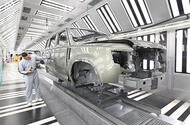How Did the JLR Cyber Attack Unfold and What’s at Stake?
If you’ve been following the news, you might have heard about the recent cyber attack that hit Jaguar Land Rover (JLR). But what really happened, and why does it matter so much? On September 1, JLR—a global icon in luxury vehicles—was struck by a cyber incident that brought its entire production line to a halt. Since then, not a single new Land Rover or Jaguar has rolled off the assembly line anywhere in the world.
The financial impact is staggering. With production frozen, industry analysts estimate JLR could be facing losses in the millions of pounds. And it’s not just about the bottom line. The disruption has rippled through every part of the business, from dealer sales and customer handovers to parts ordering. Imagine walking into a dealership, only to find out your new car can’t be registered because the systems are down. That’s been the reality for many customers and dealers since the attack.
What Kind of Data Was Affected and Who’s at Risk?
One of the most pressing questions on everyone’s mind: was customer data compromised? JLR has confirmed that “some data” was indeed “affected” during the attack. While the company hasn’t specified exactly what information was accessed, they’ve begun notifying those impacted and have involved regulators as part of their response.
This raises real concerns about privacy and security. In today’s world, a data breach can mean anything from names and addresses to financial details or even sensitive vehicle information. While JLR’s investigation is ongoing, the company says it will contact anyone whose data may have been impacted. If you’re a JLR customer, it’s wise to keep an eye on your inbox for any official communication and to monitor your accounts for unusual activity.
How Is JLR Responding to the Crisis?
JLR hasn’t been sitting idly by. The company quickly brought in police and cybersecurity experts to help contain the situation and restart global applications in a controlled, safe manner. Their IT systems were shut down almost immediately after the attack was detected—a move that, while disruptive, is often necessary to prevent further damage.
Since then, JLR has been working around the clock to rebuild its internal IT infrastructure. This is no small feat. In the meantime, dealer networks have had to get creative. Many are manually registering vehicles—a process that’s slow and labor-intensive, but keeps business moving as best as possible.
Production staff, especially at major sites in the West Midlands and Merseyside, have been told to stay home for now. The company is still paying workers and “banking” lost hours, but the uncertainty is palpable. Factories in Slovakia and India have also stopped production, underscoring the global scale of the impact.
Who’s Behind the Attack and How Did They Get In?
The cyber attack has been linked to a group known as Scattered Spider, which previously targeted major retailers and caused significant financial damage. Alongside another group called Shiny Hunters, they reportedly exploited a vulnerability in SAP Netweaver—a widely used third-party software platform. The US Cybersecurity and Infrastructure Security Agency (CISA) had warned about this flaw earlier in the year, and a patch was released. Whether JLR had applied this update remains unclear.
It’s a stark reminder that even large, well-resourced companies can fall victim to cyber threats if software vulnerabilities aren’t addressed promptly. The hackers claimed responsibility via Telegram, posting screenshots that appeared to show access to JLR’s internal systems. While there’s no official confirmation of a ransom demand, the situation is still evolving.
What Does This Mean for JLR Customers and Dealers Right Now?
For customers, the immediate impacts are frustrating but not catastrophic—yet. You can still visit dealerships, but you might find that new car registrations are being handled manually, and the online car configurator isn’t accepting build orders. Instead, buyers are being directed to choose from existing stock.
Dealers are doing their best to keep the wheels turning, but the manual processes are time-consuming and prone to delays. If you’re waiting on a new car or parts, expect longer lead times. JLR’s public-facing website is up, but behind the scenes, it’s anything but business as usual.
What Can Other Companies Learn from the JLR Incident?
This attack is a wake-up call for the entire automotive industry—and really, for any business that relies on complex IT systems. Cybersecurity isn’t just an IT issue; it’s a business continuity issue. According to a 2023 report by IBM, the average cost of a data breach globally is now $4.45 million, and the automotive sector is increasingly being targeted by sophisticated hacker groups.
One key takeaway: patch management matters. The vulnerability exploited in this attack had been flagged and patched, but if updates aren’t applied promptly, companies remain exposed. Regular security audits, employee training, and incident response planning are all crucial defenses.
Where Does JLR Go from Here?
JLR’s leadership has apologized for the ongoing disruption and promised to keep customers and partners updated as the investigation progresses. The company’s handling of the crisis—swift shutdowns, transparent communication, and proactive engagement with law enforcement—shows a commitment to doing the right thing, even under immense pressure.
For now, the road ahead is uncertain. But this incident will likely push JLR—and the wider industry—to double down on cybersecurity investments and rethink how they manage digital risk.
The Bottom Line: Staying Vigilant in a Digital World
If there’s one lesson from the JLR cyber attack, it’s that no company is immune. Whether you’re a carmaker, a retailer, or a small business, robust cybersecurity isn’t optional—it’s essential. For customers, staying informed and vigilant is the best defense. And for JLR, the coming weeks will be a test of resilience, transparency, and trust.
As the story unfolds, one thing’s clear: in today’s connected world, digital security is just as important as the cars we drive.

